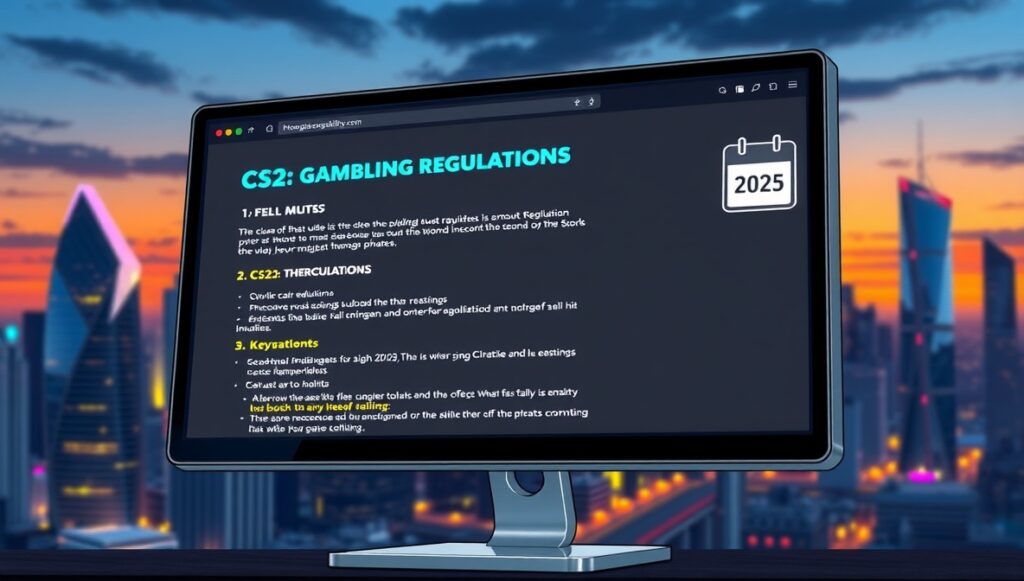
The CS2 skin gambling industry in 2025 is one of the most tightly scrutinized and rapidly evolving sectors in online gaming. With real-value skins, multiple gambling formats, and a global user base, regulation has become a complex web of national laws, platform policies, and grey areas. Here’s an in-depth look at the regulatory environment, major legal changes, compliance challenges, and what players and operators need to know this year.
What Constitutes CS2 Gambling?
- Any site or activity where players wager CS2 skins (digital cosmetic items) on games of chance, such as roulettes, jackpots, crash, coinflip, slots, or betting on esports matches.
- Due to the monetary value and liquidity of skins, many countries classify these activities as gambling, comparable to traditional bets with cash or crypto.
Overview of 2025 Regulatory Landscape
- National Laws: Different countries and states have taken diverse approaches—some ban all forms of skin gambling, others require licensing, while a few regulate only direct cash betting.
- Platform Policies: Steam, Valve’s digital marketplace, enforces a strict anti-gambling stance. Automated trading APIs are monitored, and accounts engaging in prohibited gambling can be suspended or limited.
- Third-Party Sites: Many gambling sites operate outside Steam’s ecosystem (often offshore), making regulation and enforcement difficult. Some jurisdictions block access to non-compliant domains, but users can bypass via VPNs.
- International Agreements: Ongoing efforts exist between governments, consumer-protection agencies, and esports organizations to address cross-border issues and establish baseline protections for minors and problem gamblers.
Key Legal Changes and Trends in 2025
- Licensing Requirements: Many countries now demand gambling operators possess digital gaming licenses, perform Know-Your-Customer (KYC) checks, and meet anti-money-laundering (AML) standards. Popular jurisdictions for licensing include Malta, Isle of Man, and Curacao, but enforcement varies.
- Minimum Age Enforcement: Age verification has become mandatory on most regulated platforms, often using document scans or banking data. Violations can mean heavy fines or site bans.
- Advertising Restrictions: Major platforms (Google, Meta, X) ban unlicensed CS2 gambling ads. Streamers must disclose partnerships and avoid promoting unregulated sites.
- Bans and Blockades: Russia, China, Australia, and several US states actively block or prosecute unlicensed gambling operations. European countries focus on consumer protection and addiction prevention, enforcing deposit limits and session timers.
- Loot Box Regulation: Some countries group CS2 case openings with gambling, requiring disclosure of odds, spending limits, or explicit adult ratings.
Major Regulatory Regions: 2025 Comparison
| Region/Country | Status in 2025 | Key Features | Notes |
|---|---|---|---|
| USA | Mostly illegal; state by state | Licenses required, strict age/KYC | Enforcement focus in CA, NY, TX |
| UK | Legal, tightly regulated | UKGC license, player protection, ad limits | Frequent audits |
| Russia/China | Banned | ISPs block sites, criminal penalties | Severe punishments |
| EU (varies) | Mixed; country-level rules | Malta, Isle of Man, etc.; France/Germany stricter | Some ban loot boxes |
| Australia | Mostly banned | Blocks, fines, no onshore licenses | VPN use common |
Operator Compliance in 2025
- Obtain proper licensing for each targeted jurisdiction—unlicensed operation now faces higher risks of fines, account seizures, or criminal charges.
- Implement robust age verification, KYC, and AML processes to remain compliant and avoid regulatory scrutiny.
- Use provably fair systems for games like roulette and crash to build trust and satisfy audit demands.
- Limit advertising to permitted regions and platforms, with mandatory disclaimers and responsible gambling messages.
What to Expect in the Future
- Continued crackdowns on unlicensed sites and new AI-based monitoring tools from both Valve and governments.
- Potential global efforts to harmonize loot box, skin gambling, and crypto betting regulation.
- Growth in educational campaigns and support resources for problem gambling associated with skin betting.
- More skin gaming sites seeking licenses in Malta, Isle of Man, and Curacao to retain credibility.
CS2 gambling in 2025 faces complex and often conflicting regulations. Operate only on licensed, transparent platforms and be aware of your jurisdiction’s rules. Enforcement and industry standards are rising, promising a safer but more restricted market in the years ahead.
Check local laws before playing, choose provably fair sites, and avoid gambling where outright bans apply. For trusted, regulated options, explore CS Roulette Sites and CS Jackpot Sites. Always play responsibly and watch for regulatory changes.





